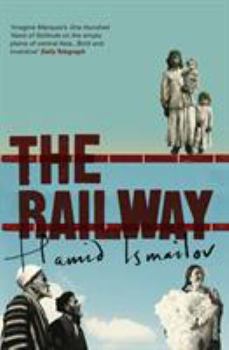The Railway
Set mainly in Uzbekistan between 1900 and 1980, The Railway introduces to us the inhabitants of the small town of Gilas on the ancient Silk Route. Among those whose stories we hear are Mefody-Jurisprudence, the town's alcoholic intellectual; Father Ioann, a Russian priest; Kara-Musayev the Younger, the chief of police; and Umarali-Moneybags, the old moneylender. Their colourful lives offer a unique and comic picture of a little-known land populated by outgoing Mullahs, incoming Bolsheviks, and a plethora of Uzbeks, Russians, Persians, Jews, Koreans, Tatars and Gypsies. At the heart of both the town and the novel stands the railway station - a source of income and influence, and a connection to the greater world beyond the town. Rich and picaresque, The Railway chronicles the dramatic changes felt throughout Central Asia in the early twentieth century.
Format:Paperback
Language:English
ISBN:B007YTJXV2
ISBN13:9780099466130
Release Date:April 2008
Publisher:Vintage UK
Length:336 Pages
Weight:0.55 lbs.
Dimensions:0.5" x 6.1" x 8.6"
Related Subjects
Contemporary Fiction Genre Fiction Historical Literature & Fiction World LiteratureCustomer Reviews
2 ratings
The wittiest and most truthful book about Central Asia that I know of
Published by Thriftbooks.com User , 16 years ago
My translation of this wonderful novel received the annual translation prize awarded by the American Association of Teachers of Slavonic and East European Languages. The citation reads as follows: Hamid Ismailov's multi-voiced, quasi-surreal novel The Railway poses almost every possible challenge to the literary translator, from puns and "talking" names to complex symbolism and detailed depictions of life in a provincial Central Asian town under Soviet rule. In his masterful translation, Robert Chandler deals with every one of these challenges with enormous creativity and panache. Never simplifying Ismailov's work or losing the particularity of any of its unique narrative voices, Chandler makes the novel accessible to English-language readers, with all its dense word play, wide-ranging cultural allusions, and complex tone, at once profoundly dark and absurdly comical. He also provides a thoughtful and informative preface, copious footnotes, an essential list of characters' names, and a map of the region. Leading his readers deftly through this remote world, Chandler introduces us to a cast of characters that appear humorously quaint and at the same time thoroughly human in their capacity for cruelty and suffering.
A Narrative History of Uzbek Life
Published by Thriftbooks.com User , 17 years ago
Reading "The Railway" is like hearing an elderly relative tell folk stories about the history of a time and place. The novel includes snippets of details about the lives of people in the Uzbek town of Gilas. The reader is taken through stories and historical events from the last 1800s to the 1970s, all through the perspectives and experiences of the people of Gilas. I highly recommend the book to anyone interested in knowing more about Central Asia and better understanding the lives the people there have lived in modern history. I have lived in Central Asia and read many non-fiction books about the region, but for me, reading this novel gave me a fresh understanding and sense of the history and collective knowledge of a group of people in the region. The tone is sarcastic, sad, serious, and funny all at the same time. No single tragedy or grand achievement is given too much attention, so that one truly gets the sense of a passage of time and the place of individual experiences in a much larger world and historical context.






